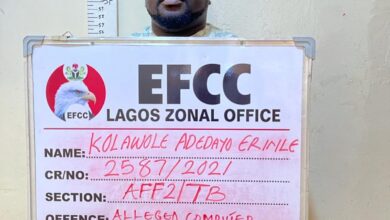
An investigative officer with the Economic and Financial Crimes Commission, EFCC, Denis Kasari, has told a Lagos State Special Offences Court in Ikeja that their investigation revealed that the son of a former Chairman, Peoples Democratic Party, Mamman Nasir, Christian Taylor, and others carried out massive oil subsidy fraud.
The Economic and Financial Crimes Commission, EFCC on Wednesday, May 31, 2023, arraigned them before Justice Mojisola Dada of the Special Offences Court sitting in Ikeja, Lagos.
They were arraigned alongside Nasaman Oil Services Limited, on an amended 49-count charge bordering on conspiracy to obtain money by false pretence contrary to Section 8 and 1(3) of the Advance Fee Fraud and Other Fraud Related Offences Act 2006; obtaining money by false pretences contrary to Section 1(3) of the Advance Fee Fraud and Other Fraud Related Offences Act 2006; forgery contrary to Section 363 (3)(j) of the Criminal Law of Lagos State 2011; and use of false documents contrary to Section 364 of the Criminal Law of Lagos State 2011.
They pleaded “not guilty” to all the charges preferred against them.
They were initially standing trial before Justice Adeniyi Onigbanjo of a Lagos State High Court sitting in Ikeja, but the trial judge withdrew from the case on health grounds, prompting the reassignment of the case to Justice Dada.
While being led in evidence by the counsel for the EFCC, Seiduh Atteh, he narrated how back in January 2012, the EFCC received petitions from the then Minister of Petroleum Resources, Mrs. Diezani Alison-Madueke; Civil Society Organizations signed by then human rights activist, Dino Melaye; one Emmanuel John, and another from Mr. Femi Falana, alleging corruption in the subsidy regime.
Identifying the said petitions, he said that they alleged massive oil subsidy fraud in the importation of petroleum products into the country.
Also Read: Digital Banking: CJN, CBN Governor Calls for Fair Legal System to Attract Foreign Investment
He told the court that at the time, he was a member of the Special Team set up by the Commission to investigate the petroleum subsidy, and that the petitions were approved and assigned to the Special team for investigation.
“The team swung into action by writing several letters of investigation activities to various offices including the then Petroleum Products Pricing Regulatory Agency, PPPRA, requesting them to furnish us with the list of licensed companies and oil marketers approved to import petroleum products into the country,” he said.
Response, he said, was received from the Agency, which prompted the team to further request all the transaction documents of the first defendant.
He said: “Response was received, which prompted us to write to the then Department of Petroleum Resources, DPR, and also the Corporate Affairs Commission, CAC, for incorporation documents of the first defendant.
“We received responses, and we also wrote to Sterling Bank Plc to authenticate the Form M used for the transactions in question.”
He testified further that the bank responded, after which the team also wrote to the Debt Management Office, DMO “to furnish us with all the Sovereign Debt Notes of the first defendant”.
According to him, the findings prompted the EFCC to extend its investigation to Arlage Oil and Gas Limited and Saybolt Nigeria Limited.
Read Also: N5bn Laundering: Former JAMB Registrar Ojerinde Trial Continues June 20
“Some documents recovered during the investigation, were sent to Saybolt Nigeria Limited, an inspection company, for authentication, and the company responded,” he said.
According to him, responses were received from the company, alongside other companies the team wrote to, including one SGS Inspection Services, and Inspectorate Marine Nigeria Services Limited.
“Again we wrote to Sterling Bank Nigeria requesting for the mandate form and statement of account of the first defendant and response was equally received,” he said.
He testified further that the DMO was requested to furnish the EFCC with all the Debt Notes provided to the first defendant and the acknowledgment copies of who collected the Sovereign Debt Notes.
“We received responses from all those we wrote to, and in the course of our investigations, the third defendant submitted to the Commission a Memorandum of Understanding, MoU between the first defendant represented by the second defendant,” he said.
He thereafter identified the petitions received, the letters sent out by the EFCC in the course of the investigation as well as the responses.
Atteh, thereafter, sought to tender them in evidence.
There was no objection raised by the defence counsel, Toyin Pinheiro, SAN.
“The documents sought to be tendered have gone through the previous trial and were admitted in evidence,” Pinheiro said.
They were thereafter admitted in evidence as Exhibit P to P18.
Click To Read: EFCC Arraigns 2 Investors For Laundering About a Billion Naira
Testifying further, the witness told the court that responses received indicated that the first defendant was licensed to import petroleum products into the country.
“In exhibit P18, the first defendant executed six transactions and three out of them were successfully carried out, but the three others required further investigation,” he said.
He testified further that investigations revealed that documents credited to Saybolt Nigeria Limited and the Inspectorate Marine Nigeria Services for ship-to-ship transfers of PMS from mother vessels to daughter’s vessels were forged.
He revealed further that investigations showed that the first defendant in the three transactions in question was paid for PMS not supplied.
According to him, the first defendant benefited from N749,991,273.36 and N1,480,074,125.61, as subsidy payments for PMS not supplied.
He told the court that the investigation revealed that the second defendant was a director and shareholder in the first defendant.
He testified that in the course of the investigation, the defendants denied knowledge of the said transactions.
“This made us contact the DMO and the response received on the said three transactions was it was the third defendant that signed and received the Sovereign Debt Notes for N749,991,273.36 and the N1,480,074,125.61,” he said.
You May Like To Read: NPA Retiree Appeal AGF To Obey Supreme Court Order, Pay Retirement Pension
He testified further that the said MoU used for the transaction was between the first defendant and Arlage Oil and Gas Limited, which had Seun Ogunbambo as one of the directors and shareholders.
He told the court that the investigation revealed that the first defendant opened another bank account with Sterling Bank as agreed in the said MoU with one Abdul Afeez Olabisi as the sole signatory.
He said: “Investigation revealed that the entire subsidy paid by the CBN entered this same account.
“Also my lord, when the agreement between the first defendant and Arlage Oil and Gas Limited was signed the sum of N36million was paid into another Sterling Bank account belonging to the first defendant where the second defendant is the sole signatory and that same day sum of N25 million was withdrawn by the first defendant.”
The case has been adjourned till Thursday, September 14, 2023, for continuation of trial.
One of the counts reads: “Nasaman Oil Services Ltd, Mamman Nasir Ali, Christian Taylor, Oluwaseun Ogunbambo (now at large) and Olabisi Abdul-Afeez (still at large) on or about the 9th day of November 2011 at Lagos within the Ikeja Judicial Division with intent to defraud conspired to obtain the sum of N749,991,273.36 (Seven Hundred and Forty-nine Million, Nine Hundred and Ninety-one Thousand, Two Hundred and Seventy-three Naira Thirty-six Kobo) from the Federal Government of Nigeria by falsely claiming that the sum of N749,991,273.36 represented subsidy accruing to Nasaman Oil Services Ltd under the Petroleum Support Fund for the importation of 10,031,986 litres of Premium Motor Spirit (PMS) which Nasaman Oil Services Ltd purported to have purchased from SEATAC Petroleum Ltd of British Virgin Islands and imported into Nigeria through MT Liquid Fortune Ltd of British Virgin Islands and imported into Nigeria through MT Liquid Fortune Ltd Ex MT Overseas Lima, which representation you knew to be false.”
Another count reads: “Nasaman Oil Services Ltd, Mamman Nasir Ali, Christian Taylor, Oluwaseun Ogunbambo (now at large) and Olabisi Abdul-Afeez (still at large) on or about the 11th day of April 2011 at Lagos within the Ikeja Judicial Division with intent to defraud obtained the sum of N1,480,074,125.61 (One Billion Four Hundred and Eighty Million Seventy-four Thousand, One Hundred and Twenty-five Naira Sixty-one Kobo) from the Federal Government of Nigeria by claiming that the sum represented subsidy accruing to Nasaman Oil Services Ltd under the Petroleum Support Fund for the importation of 20,492,982.50 liters of Premium Motor Spirit (PMS) which Nasaman Oil Services Ltd purported to have purchased from SEATAC Petroleum Ltd of British Virgin Islands and imported into Nigeria through MT Liquid Fortune Ex Mt. Hellenic Blue and Ex MT. Milleura which representation you knew to be false.”







